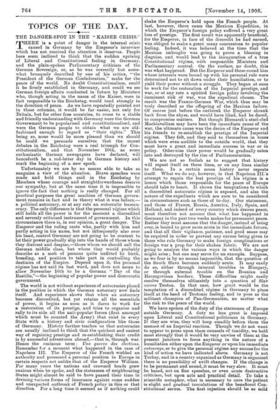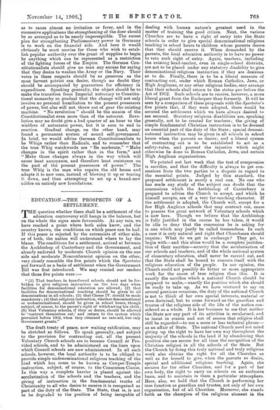TOPICS OF THE DAY.
THE DANGER-SPOT IN THE " KAISER CRISIS." THERE is a point of danger in the internal crisis caused in Germany by the Emperor's interview which has not received the attention it deserves. People here seem inclined to think that the sudden uprising of Liberal and Constitutional feeling in Germany, and the plain-spoken Parliamentary criticism of the German Sovereign, or, as he was correctly but some- what brusquely described by one of his critics, " the President of the German Confederation," make for the peace of the world. No doubt Constitutionalism, could it be firmly established in Germany, and could we see German foreign affairs conducted in future by Ministers who, though acting in the name of the Kaiser, were in fact responsible to the Reichstag, would tend strongly in the direction of peace. As we have repeatedly pointed out in these columns, it would be far easier, not only for Britain, but for other free countries, to come to a stable and friendly understanding with Germany were the German Government to be popularised and constitutionalised, and were the German people to obtain what we are old- fashioned enough to regard as " their rights." This being so, none would be more pleased than we should be could we persuade ourselves that the recent debates in the Reichstag were a real triumph for Con- stitutionalism, and that November 10th, as some enthusiastic German newspapers have declared, will henceforth be a red-letter day in German history and mark the beginning of a new epoch.
Unfortunately we are by no means able to take so sanguine a view of the situation. Brave speeches were made and bold things said in the Reichstag by Members whose courage and straightforwardness deserve our sympathy, but at the same time it is impossible to ignore the fact that nothing is really changed. For all practical purposes the great machine of German govern- ment remains in fact and in theory what it was before,— a political autocracy, or at any rate an autocratic bureau- cracy. The only difference is that the personal regime which still holds all the power is for the moment a discredited and severely criticised instrument of government. •In this circumstance there is, in our opinion, a great danger. The Emperor and the ruling caste who, partly with him and partly acting in his name, but not infrequently also over his head, control Germany are not going to be content to let their power gradually slip into the hands of those whom they distrust and despise,—those whom we should call the German middle class, but whom they would probably describe as a mob of persons quite unfitted by birth, breeding, and position to take part in controlling the destinies of the Empire. Depend upon it, the personal regime has not said its last word, and does not mean to allow November 10th to be a German " Dav of the Bastille,"—the beginning of popular power and democratic government.
The world is not without experience of autocracies placed in the position in which the German autocracy now finds itself. And experience shows that when an autocracy becomes discredited, but yet retains all the essentials of power, it begins as soon as it dares to work for a restoration of its prestige, and tries to organise and rally to its side all the anti-popular forces (first amongst' which must be counted the Army) that exist in every State with a history and civic configuration like those of Germany. History further teaches us that autocracies are usually inclined to think that the quickest and easiest way of regaining prestige and re-establishing their credit is by successful adventures abroad,—that is, through war. Hence the ominous term : Une guerre des elections. Remember for a moment what happened in the case of Napoleon III. The Emperor of the French wielded an authority and possessed a personal position in Europe in certain respects not unlike that of • the Emperor William. For many years the nations and crowned heads grew anxious when he spoke, and the statesmen of neighbouring States might almost be said to have passed their time in devising various forms of insurance against some sudden and unexpected outbroak of French policy in this or that direction. For a long time it seemed as if nothing could shake the Emperor's hold upon the French people. At last, however, there came the Mexican Expedition, in which the Emperor's foreign policy suffered a very great loss of prestige. The first result was apparently beneficial, for the Emperor, in face of the discredit he had earned, was obliged to make a great many concessions to popular feeling. Indeed, it was believed at the time that the Mexican imbroglio was going to prove a blessing in disguise, and would lead to the inauguration of a true Constitutional regime, -with responsible Ministers and Parliamentary control. On the surface, no doubt, this was what happened. But the Emperor and those round him whose interests were bound up with his personal rule were determined not to sit down under their humiliation, or to yield their power without a struggle. They began at once to work for the restoration of the Imperial prestige, and war, or at any rate a spirited foreign policy involving the imminent risk of war, was the expedient chosen. The result was the Franco-German War, which thus may be truly described as the offspring of the Mexican failure. Of course just before the outbreak the Emperor shrank back from the abyss, and would have liked, had he dared, to compromise matters. But though Bismarck's steel-clad Machiavellism may have been the immediate cause of the war, the ultimate cause was the desire of the Emperor and his friends to re-establish the prestige of the Imperial regime. They felt, and they said to themselves in tones which were even audible to the outside world, that they must have a great and immediate success in war or in policy. Otherwise their power would be gradually eaten into and destroyed by the rise of Parliamentarism.
We are not so foolish as to suggest that history will repeat itself on these lines, or on any lines similar to them. In a certain sense history never repeats itself. What we do say, however, is that Napoleon III.'s attempt to regain the lost prestige of his regime is a lesson which those responsible for the peace of Europe should take to heart. It shows the temptations to which a discredited autocratic regime is exposed, and also the nature of the expedients which are sure to be considered in circumstances such as those of to-day. Our statesmen, and those of France, Russia, America, Italy, Spain, and Holland, and indeed of every country which desires peace, must therefore not assume that what has happened in Germany in the past two weeks makes for permanent peace. Rather they must assume that the danger, instead of being over, is bound to grow more acute in the immediate future, and that all their vigilance, patience, and good sense may be required in order to prevent any excuse being given to those who rule Germany to make foreign complications or foreign war a prop for their shaken fabric. We are not going to analyse the various ways in which the danger might arise ; but one may serve for an example. Suppose, as we fear is by no means impossible, that the question of the South Slays becomes suddenly acute. It may easily do so, either through internal troubles in Hungary, or through external trouble on the Bosnian and Herzegovinan borders. These difficulties might easily resolve themselves ultimately into a question of Slav versus Teuton. In that case, how great would be the temptation of a discredited regime in Germany to place itself at the head of Teutonic feeling, and to pose as the militant champion of Pan-Germanism, no matter what the risk to the peace of the world.
We have spoken of the duty of the statesmen of Europe outside Germany. A duty no less great is imposed upon Liberal and Constitutional politicians in Germany. If they are wise, they will keep steadily before them the menace of an Imperial reaction. Though we do not want to appear to press upon them counsels of timidity, we hold most strongly that it would be very unwise of them at the present juncture to force anything in the nature of a humiliation either upon the Emperor or upon his immediate entourage, or to give the personal regime any excuse for the kind of action we have indicated above. Germany is not Turkey, and in a country organised as Germany is organised there is no possibility of swift changes. If the change is to be permanent and sound, it must be very slow. It must be based, not on fine speeehes, or even acute destructive criticism, but upon acts and practical detail. To take a scientific metaphor, what is necessary to cure the patient is slight and gradual inoculations of the beneficent Con- stitutional serum. The first injection should be so mild as to cause almost no irritation or fever, and in the successive applications the strengthening of the dose should be so arranged as to be nearly imperceptible. The surest plan for strengthening Parliamentary power in Germany is to work on the financial side. And here it would obviously be most unwise for those who wish to estab- lish popular authority over the grant of supplies to begin by anything which can be represented as a restriction of the fighting forces of the Empire. The German Con- stitutionalists should give no man any excuse for saying that they desire to weaken the Army or the Navy. Their votes in these respects should be as generous as the most fervent patriot can desire, though no doubt they should be accompanied by guarantees for efficiency in expenditure. Speaking generally, the object should be to make the transition from Imperial autocracy to Constitu- tional monarchy so gradual that the change will not only involve no personal humiliation to the present possessors of power, but also will not throw out of gear the existing machine. " No revolution " should be the maxim of the Constitutionalist even more than of the autocrat. Revo- lution may no doubt give a bad quarter of an hour to the wielders of autocratic power, but it is sure to end in reaction. Gradual change, on the other hand, may found a permanent system of sound self-government. In brief, we would advise German Constitutionalists to be Whigs rather than Radicals, and to remember that the true Whig watchwords are "Be moderate," "Make changes in the spirit rather than in the form," and " Make those changes always in the way which will cause least annoyance, and therefore least resistance ou the part of the present possessors of power." The true Whig is the man who repairs the old house and adapts it to new uses, instead of blowing it up or tearing it down, and then attempting to set up a brand-new edifice on entirely new foundations.











































 Previous page
Previous page